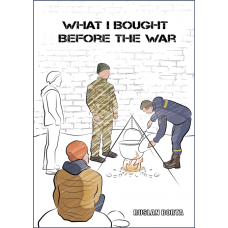- Наявність: Є в наявності
-
Авторський колектив: Ruslan Borta
Переклад: Andrew Sheppard
Тип видання: повість
Видання:
Рік видання: 2023
Кількість сторінок: 210
Формат: А5, 60*84 1/16
Обкладинка: м'яка
Переглянути зміст книги
The timespan of this novel, What I Bought Before the War, essentially covers just three days: 24th February 2022, the day of Russia’s invasion of Ukraine, the previous day and the day after1.
Four 30-year-old men, Romko, Victor, Artem and Stanislav, all grew up in Nizhyn, a modest-sized city 120 km northeast of Kyiv, and were school classmates. They have since gone their separate ways, but the outbreak of war chances to bring all of them back to Nizhyn, which becomes the focal point of the action in the novel.
Each of the four friends offers his own account of his experience of one or more of the relevant February days, moving from the widespread disbelief – or subconscious denial – that Ukraine is on the brink of a comprehensive invasion, through their acceptance of and response to the fact. Each of them does his best to track what is happening in the various places about which he has reason to be particularly concerned – they include Irpin, Hostomel, Chernihiv, and Kharkiv – and of course in Nizhyn, where the Russians surprise with an attack of little apparent strategic logic.
Through the four protagonists’ backstories, we also learn much of the lived experience of young Ukrainians during the first three decades of their country’s independence. Specifically, we learn what made the generation now resisting the invasion with such vigour and tenacity. From the two who served in the Armed Forces of Ukraine during the eight-year war in Donbas, what we learn includes something specifically about that too.
The story unrolls as it proceeds: many questions arising in the reader’s mind not being answered until later, sometimes much later. One query that gradually assumes prominence in the course of the penultimate contribution, from Stanislav, becomes a significant mystery, one that partially endures even as the reader closes the book.




